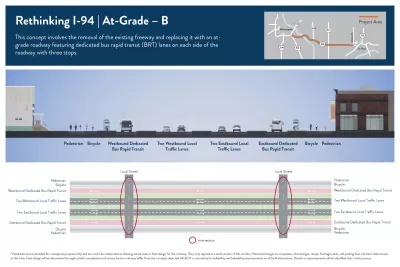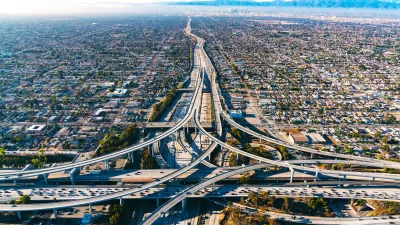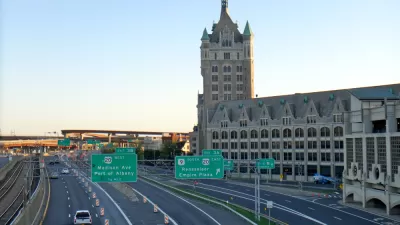Two new proposals for replacing the freeway with at-grade segments offer new visions for the future of downtown Minneapolis.

“In mid-July, the Minnesota Department of Transportation rolled out a slate of 10 design alternatives for the future of a 7.5-mile stretch of Interstate 94 that runs between Minneapolis and St. Paul, including two options that would bring the highway to grade and convert it into a boulevard, which won the most community support in early public meetings.” Writing in Streetsblog, Kea Wilson explains the controversy around the project.
The new proposals to tear down the road contradict previous assessments that removal wouldn’t be possible. “For local non-profit Our Streets Minneapolis, though, thoroughly reimagining I-94 isn't just the best option on the table — it's the only option if the Land of 10,000 Lakes truly wants to reckon with the racist legacy of its transportation choices.”
Our Streets wants MnDOT to go even further and adopt “a more ambitious concept they're calling Twin Cities Boulevard, which would incorporate subways, extend a major greenway, and expand the project area to include other adjacent highways that the group says would be ripe for repurposing if I-94 were removed.”
Other groups support the proposed “Rondo Community Land Bridge, a 16-acre cap that would leave the highway intact, but establish a cultural enterprise district aimed at restoring intergenerational wealth to African-American Minnesotans atop it.” This proposal received a $2 million Reconnecting Communities grant for research and planning.
“One thing both advocacy groups can agree on, though, is that like urban highways in virtually every city in America, I-94 has had a catastrophic impact on the Twin Cities' most marginalized — and its next chapter must be a catalyst for change.”
FULL STORY: Twin Cities Advocates Split Over What’s Possible for Their Downtown Highway

Planetizen Federal Action Tracker
A weekly monitor of how Trump’s orders and actions are impacting planners and planning in America.

Congressman Proposes Bill to Rename DC Metro “Trump Train”
The Make Autorail Great Again Act would withhold federal funding to the system until the Washington Metropolitan Area Transit Authority (WMATA), rebrands as the Washington Metropolitan Authority for Greater Access (WMAGA).

The Simple Legislative Tool Transforming Vacant Downtowns
In California, Michigan and Georgia, an easy win is bringing dollars — and delight — back to city centers.

The States Losing Rural Delivery Rooms at an Alarming Pace
In some states, as few as 9% of rural hospitals still deliver babies. As a result, rising pre-term births, no adequate pre-term care and harrowing close calls are a growing reality.

The Small South Asian Republic Going all in on EVs
Thanks to one simple policy change less than five years ago, 65% of new cars in this Himalayan country are now electric.

DC Backpedals on Bike Lane Protection, Swaps Barriers for Paint
Citing aesthetic concerns, the city is removing the concrete barriers and flexposts that once separated Arizona Avenue cyclists from motor vehicles.
Urban Design for Planners 1: Software Tools
This six-course series explores essential urban design concepts using open source software and equips planners with the tools they need to participate fully in the urban design process.
Planning for Universal Design
Learn the tools for implementing Universal Design in planning regulations.
Smith Gee Studio
City of Charlotte
City of Camden Redevelopment Agency
City of Astoria
Transportation Research & Education Center (TREC) at Portland State University
US High Speed Rail Association
City of Camden Redevelopment Agency
Municipality of Princeton (NJ)





























